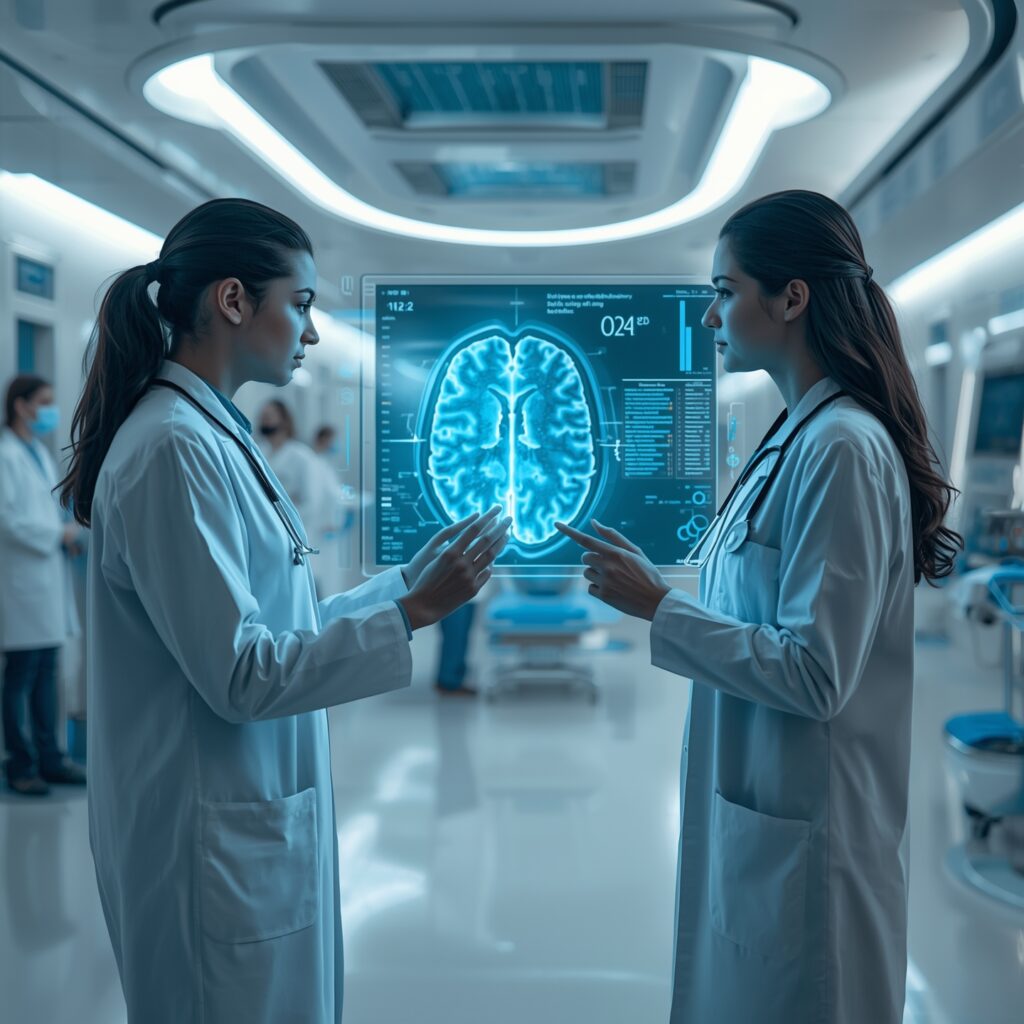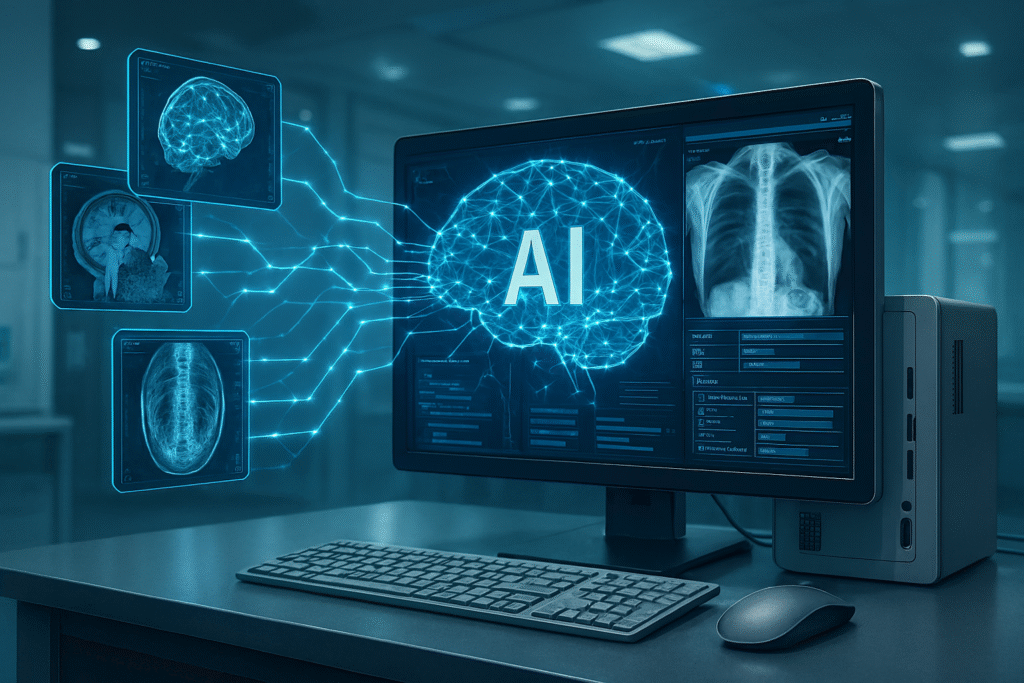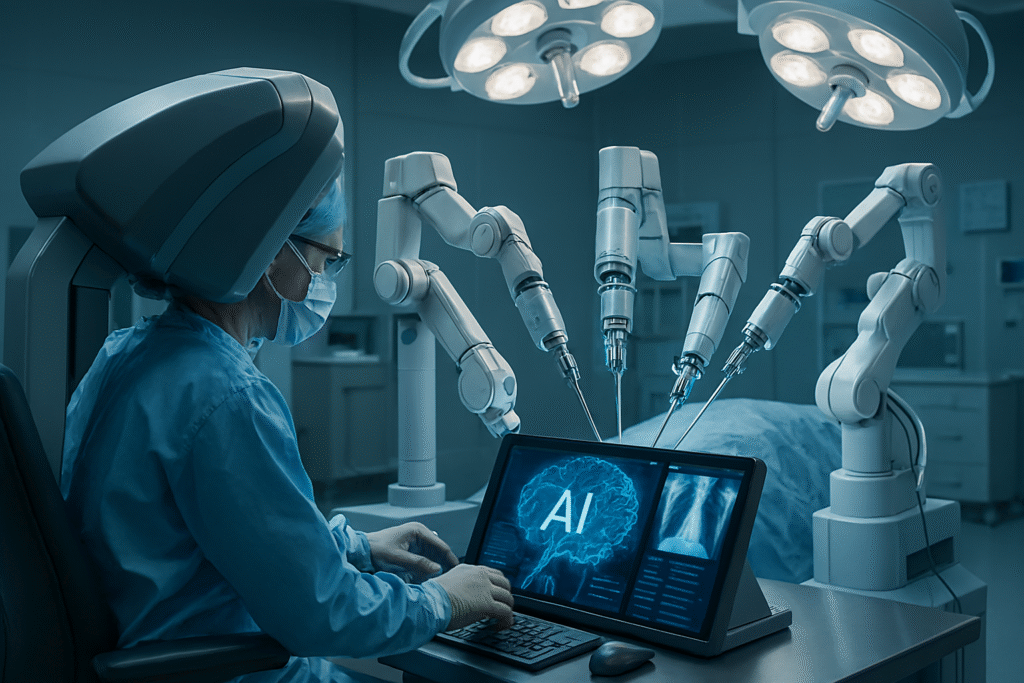
Introduction
Healthcare is one of the most important industries in the world, but it’s also one of the most complex. Doctors, nurses, and hospitals are under constant pressure to deliver faster results, provide personalized care, and reduce costs. Enter artificial intelligence (AI)—a game-changer that’s already transforming how medicine is practiced.
The 10 Benefits of AI in Healthcare go far beyond convenience. From detecting diseases early to helping doctors perform life-saving surgeries, AI has become a powerful partner in modern medicine. In this article, we’ll break down these benefits in simple, engaging language and show you why AI in Healthcare is more than just a buzzword—it’s the future.
What is AI in Healthcare?
So, what exactly is AI in Healthcare? Put simply, it’s the use of smart algorithms and machines that can “think” like humans to support medical decision-making. Instead of relying only on traditional methods, doctors can now use Clinical AI tools to analyze massive amounts of medical data, recognize patterns, and even predict future health risks.
Some of the main technologies powering AI include:
- Machine Learning (ML): Learns from past data to predict outcomes.
- Natural Language Processing (NLP): Reads and understands medical notes.
- Computer Vision: Interprets X-rays, MRIs, and CT scans with high accuracy.
- Robotics: Assists in performing delicate surgeries.
Think of AI as a super-smart assistant that never sleeps. It doesn’t replace doctors, but it gives them powerful insights to treat patients faster and more effectively. Companies like Aidoc AI are already leading the way with advanced tools for radiology and emergency care.
Benefit of AI in Healthcare
1. Faster and More Accurate Diagnoses
When it comes to diagnosing diseases, speed and accuracy can make the difference between life and death. That’s why AI in Healthcare is such a breakthrough.

AI can quickly scan thousands of medical images and highlight problem areas a human eye might miss. For example, Aidoc AI specializes in identifying strokes, pulmonary embolisms, and brain hemorrhages in real-time, enabling doctors to act immediately.
This reduces the risk of misdiagnosis and ensures patients get treatment faster. Imagine AI as a second pair of “superhuman eyes” that supports radiologists and helps save lives.
2. Personalized Treatment Plans
No two patients are exactly alike. One-size-fits-all treatments often don’t work, which is why Clinical AI has become so valuable.
AI analyzes data such as a patient’s age, genetics, lifestyle, and medical history to suggest customized treatment options. For cancer patients, this could mean receiving the most effective therapy with fewer side effects. For diabetics, it might mean real-time adjustments in medication based on glucose monitoring.
This personalized medicine ensures better outcomes and happier patients.
3. Speeding Up Drug Discovery
Developing a new drug can take 10–15 years and billions of dollars. But with AI, this timeline is shrinking dramatically.
AI models can predict which chemical compounds are most likely to become effective drugs, saving researchers years of trial and error. During the COVID-19 pandemic, AI was used to identify possible treatments at record speed, showing how powerful this technology can be in urgent situations.
Faster drug development doesn’t just save money—it saves lives.
4. Predictive Analytics for Preventive Care
Wouldn’t it be amazing if doctors could predict illnesses before they even happen? With AI, that’s already becoming reality.
Wearables like smartwatches gather data on heart rate, sleep, and activity levels. AI then analyzes this information to spot early signs of health issues, such as heart disease or diabetes, before symptoms appear.
This proactive approach helps patients take preventive steps and reduces the burden on hospitals. AI in Healthcare shifts the focus from “treating illness” to “staying healthy.”
5. Enhanced Patient Monitoring
Chronic diseases like heart failure, asthma, and diabetes require constant monitoring. AI makes this much easier through remote patient monitoring systems.
Imagine a heart patient wearing a device that tracks their condition 24/7. If the AI detects something unusual, it alerts doctors instantly. This means patients don’t always need to visit hospitals for checkups, making healthcare more convenient and responsive.
The rise of telehealth combined with AI is giving patients more freedom while keeping doctors informed.
6. Reducing Administrative Burden
Doctors spend hours filling out forms, updating patient records, and handling billing. It’s stressful, time-consuming, and takes them away from patient care.
Clinical AI is changing this by automating repetitive tasks. Voice-to-text AI can record doctor-patient conversations into notes, while smart systems handle billing and scheduling.
This not only reduces errors but also gives healthcare professionals more time to focus on what really matters: patients.
7. AI in Surgery and Robotics
One of the most exciting developments in AI in Healthcare is robotic-assisted surgery. These AI-powered systems help surgeons perform complex operations with extreme precision.

For instance, the Da Vinci Surgical System allows doctors to make smaller incisions, reducing pain, risk, and recovery time for patients. With AI assisting in real-time, surgeries are safer and more effective.
It’s like giving surgeons an extra set of steady, highly accurate hands.
8. Supporting Mental Health
Mental health is a global challenge, and AI is stepping in to provide solutions.
AI-powered chatbots and mobile apps offer 24/7 support for people struggling with anxiety, stress, or depression. These tools can guide users through relaxation techniques, provide emotional support, or encourage them to seek professional help when needed.
Clinical AI can also analyze speech and behavior patterns to detect early signs of mental illness, making intervention possible before conditions worsen.
9. Cutting Healthcare Costs
Healthcare costs are rising, and patients often bear the burden. By increasing efficiency, AI can significantly cut costs for hospitals and patients alike.
- Predictive care reduces hospital readmissions.
- Automated systems cut down on paperwork and errors.
- Faster diagnoses save money on unnecessary tests.
Hospitals using Aidoc AI report shorter patient stays and higher efficiency, proving that AI can be both life-saving and cost-effective.
10. Expanding Healthcare Acces
Not everyone has access to quality healthcare, especially in rural areas. AI is helping bridge this gap.
Telemedicine platforms powered by AI provide virtual consultations, giving patients access to medical advice without traveling long distances. AI chatbots can even guide patients in basic health management until they reach a doctor.
This ensures that healthcare is no longer limited to big cities—AI in Healthcare is making it more accessible worldwide.
Challenges of AI in Healthcare
Of course, AI isn’t perfect. Some of the challenges include:
- Data privacy: Patients worry about how their information is stored and shared.
- Ethical issues: Should AI make life-and-death decisions?
- High upfront costs: Not all hospitals can afford advanced AI systems.
Addressing these challenges is key to building trust and ensuring safe adoption of AI technologies.
The Future of AI in Healthcare
The future of Clinical AI looks promising. Emerging trends include:
- Digital twins: Virtual models of patients to test treatments before applying them in real life.
- Global health prediction: AI spotting outbreaks before they spread.
- Fully personalized care plans: AI working as a health coach for individuals.
Companies like Aidoc AI are leading the way, and within the next decade, AI will become a standard part of healthcare, much like stethoscopes and blood tests today.
Conclusion
The 10 Benefits of AI in Healthcare show just how transformative this technology is. From faster diagnoses and personalized treatments to reduced costs and improved accessibility, AI is improving every corner of the healthcare industry.
While challenges exist, the benefits outweigh the risks. By embracing Clinical AI tools like Aidoc AI, the healthcare industry can build a smarter, faster, and more patient-focused future.
FAQs
1. Can AI replace doctors?
No. AI supports doctors by analyzing data and providing insights, but human expertise and empathy are irreplaceable.
2. How safe is Clinical AI?
It’s safe when used responsibly. With proper data security and oversight, AI can enhance care without replacing human judgment.
3. What conditions can Aidoc AI detect?
Aidoc AI is used for conditions like strokes, pulmonary embolisms, and intracranial hemorrhages, among others.
4. Is AI affordable for small hospitals?
The initial cost may be high, but over time, AI reduces expenses by improving efficiency and outcomes.
5. What’s the future of AI in Healthcare?
Expect more personalized care, predictive health monitoring, and AI-driven telemedicine in the next decade.

Leave a Reply